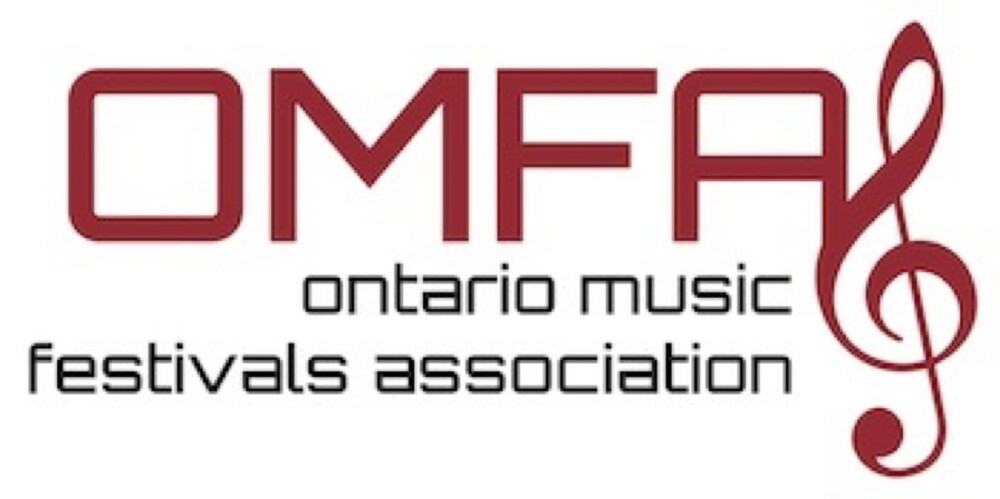Glossary of Terms
Accompaniment – A subordinate part for instruments, voices or ensembles – usually piano.
Adult – A competitor over the age of 29 as of January 1, 2026.
Advanced Level – Competitors who are are between the ages of 19-28 as of January 1, 2026.
All competitors must be amateurs.
An amateur shall be defined as:
- Any person whose principal means of livelihood is not obtained from the performance or teaching of music in the particular category/discipline in which he/she is competing, even though from time to time they may receive remuneration on an occasional basis (not full-time).
CHILDREN (ages 6 – 18)
- A child under the age of 18 who is cast or performs in an unpaid local community theatre production, or who participates in an educational program (eg. Drayton Youth Ensemble), for a period of less than eight weeks, is eligible to compete at the OMFA Provincials Finals.
- A child performer who is enrolled as a full or junior member of either ACTRA or Equity is eligible to compete at the OMFA Provincial Finals in any discipline if they have not had paid work for a six month period within the calendar year.
- The festival calendar year is September 1 – August 31.
- A professional child performer is one who is under the age of 18 and works in paid performance contracts of six months or more within a calendar year (eg. Stratford Festival, Shaw Festival, touring productions, Mini-Pops, opera, orchestra, etc.).
- These performers will not be eligible to enter ANY of the four voice disciplines – classical voice, musical theatre, songs from the screen or popular voice during the calendar year in which they are under a professional contract.
- A professional child performer who receives payment when cast in a commercial or in a movie with spoken lines or who does voice-over work, will not be eligible during the calendar year (when the commercial or movie was filmed) to enter the Speech Arts discipline.
ADVANCED (ages 19-28) and ADULTS (29 years and over)
- Advanced and/or Adult professional performers who are full members of ACTRA or Equity are not eligible to compete at the OMFA Provincial Finals.
- An exception is made for performing in another different discipline that is unrelated to the reason for professional membership (eg. a professional musical theatre performer can be recommended to classical piano).
- An individual earning income from teaching full-time privately or in the school system is not eligible to compete.
- An exception is made for a music teacher in one discipline who is recommended as an amateur in another different discipline (eg. a piano teacher may enter as an amateur in strings, woodwinds, brass, voice, etc.).
- An individual with a music degree in one instrument is eligible to compete in another discipline different from that of the instrument for which they received their degree.
- An individual who has completed a Master’s degree in Music is considered professionals and is not eligible to compete.
- An individual who has completed a Bachelor degree in Music or is currently enrolled in a Master’s degree in Music is eligible to compete if not teaching or performing professionally full time within the festival calendar year.
- A professional performer or music teacher who is a member of a choir, band or orchestra, is eligible to compete as part of the group, provided that the majority of the other members are amateurs and the group itself is amateur. Conductors or accompanists may be professional.
- If the individual has received professional income after they were recommended to the OMFA Provincial Finals, they are ineligible to participate and their entry fee would be refunded, if applicable.
ARCT/A.Mus. – The level directly after Level 10 in either the RCM and CC syllabi.
Class – Each discipline is divided into sub-categories by instrument, and/or by age, and/or by grade level. Each is identified by a five-digit number.
Competitor – A non-professional student who has been recommended to a class indicated in the OMFA Syllabus.
Conservatory – A music training institution that publishes lists of repertoire for exams.
CC– Refers to the Conservatory Canada Syllabus
Discipline – A discipline is a particular area of musical or speech study. A discipline may be for a group such as Band and Chorus or may be for a soloist such as Piano, Vocal, Speech, and a number of different instruments.
Disqualification – Competitors who do not comply with the OMFA rules and regulations will be disqualified.
Graded Level – Applies to RCM (Royal Conservatory of Music) or CC (Conservatory Canada) levels/grades from Grade 1 to 10.
Hand-Held Props – Items used onstage by the performer that can be held in their hands, eg. brush, wand, mirror scarf.
OMFA – Ontario Music Festivals Association is the umbrella body of 42 local member festivals in the province of Ontario
OPEN – Classes that are offered for competitors who are performing at the ARCT/A.Mus. level or above
RCM – Refers to the Royal Conservatory of Music Syllabus
